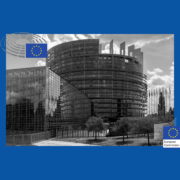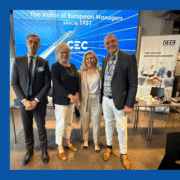This position paper on Smart Change puts managers at the heart of Europe’s sustainable transition
Shortly after the European Elections 2024, and in a significant step towards realizing the ambitious goals of the European Green Deal, CEC European Managers released a new position paper emphasizing the role of “Smart Change” in creating a sustainable and technologically advanced Europe.
As one of the six EU Commission‘s social partners and authorised voice in defense of EU leaders, CEC aims to galvanize policymakers and stakeholders to place managers at the center of the sustainable transition and decision-making processes.
Smart change must be an essential and integrated part of all EU institutional decisions leading to the use of technology and organisational development
CEC European Managers Working group on Smart Change
Position Paper
You can download our position paper on Smart Change here [+]
The European Green Deal: A Call for Transformation
The European Green Deal represents a major shift towards a sustainable future, requiring comprehensive infrastructure changes and the adoption of innovative technologies. Central to this vision are advancements in communication technologies, new energy sources, and modern mobility structures. Key components driving these changes include Artificial Intelligence (AI), digitalisation, high-speed internet, and low-carbon energy solutions.
Recognizing the complexity and non-linear nature of implementing these changes, CEC European Managers established a working group on Smart Change in December 2021 to acknowledge the crucial role European managers play in achieving the necessary development results within a reasonable timeframe.
Due to the results of the European Parliament Elections held a week ago (6-9 June 2024), some aspects of the application of the EU Green Deal are expected to be adapted in the months ahead.
Even if the EU’s commitment to sustainability becomes less ambitious than expected, the general aspects of the green regulations won’t change, and in any case, managers and leaders will play a critical role.
Working Group on Smart Change
The working group, chaired by Marco Vezzani, former CEC European Managers Deputy Secretary General until recently, comprises experts from various member organisations of CEC European Managers’ confederation. Its primary focus is on the managerial role in technological and organisational dimensions, and what the role of leaders should be regarding the challenges derived from the current changes in the economic and social systems. Smart Change is, therefore, an essential meeting point for policymakers and decision-makers that wish to seek for an active facilitation process within the European labour markets. This includes industrial strategy, energy, iron and steel sectors, transport, and mobility, as well as broader socio-economic aspects.
Through discussions and debates, the group has developed a comprehensive policy statement, which CEC believes to be essential for building a new, smarter Europe. The working group’s policy statement reads:
“Smart change must be an essential and integrated part of all EU institutional decisions leading to the use of technology and organisational development. CEC European Managers strongly supports all EU initiatives aimed at disseminating knowledge, training, and education on the use of smart change, emphasizing that all initiatives must address the role of European managers as key players in adopting smart change.”
The Role of Managers in Smart Change
Managers are identified as key navigators and bridge-builders in the journey towards Smart Change. Through strategic planning, continuous communication, and empathetic leadership, they guide organisations through complex transitions, ensuring that goals are met and workforce motivation remains high.
Smart Change is seen here as the managerial approach necessary to tackle current threats and enhance the technical and organisational levels of industries. This approach is critical for achieving the economic and social development goals that European leaders and citizens strongly support.
Recommendations for European Institutions
The working group proposes several policies for European institutions, such as Facilitating Global Competitiveness by prioritizing initiatives such as reshoring, fostering innovation, investing in research and development (R&D), and comprehensive training programs or integrating sustainable development through a holistic approach that combines economic prosperity, technological advancement, and social well-being.
By focusing on these pillars, European institutions can enhance economic resilience and competitiveness, laying the foundation for a sustainable future.
To sum up, CEC European Managers’ position paper underscores the importance of smart change in driving Europe’s sustainable transformation. By integrating smart change into EU policies and empowering managers, Europe can achieve its economic, technological, and social goals, ensuring a prosperous and sustainable future for all citizens. The call to action is clear: managers must be at the forefront of this transformative journey, steering organisations towards sustainable practices within a reasonable timeframe.

Download and share our Smart Change carousel for Social media here [+]
You can download our position paper on Smart Change here [+]











